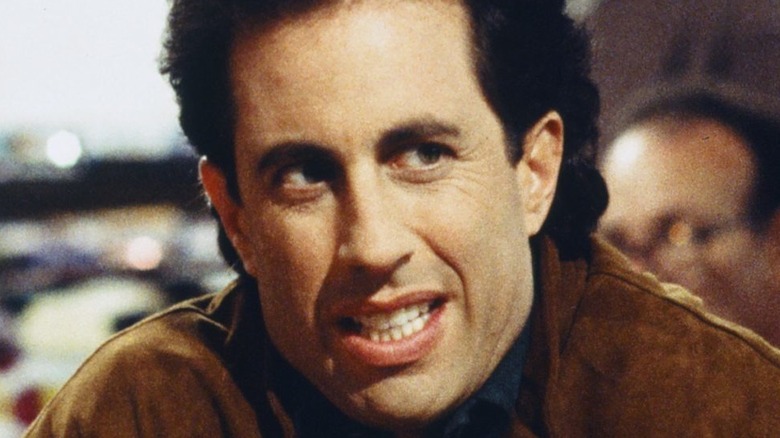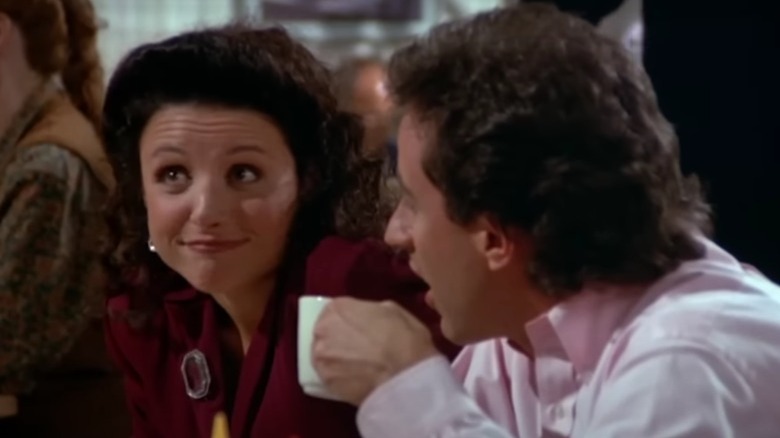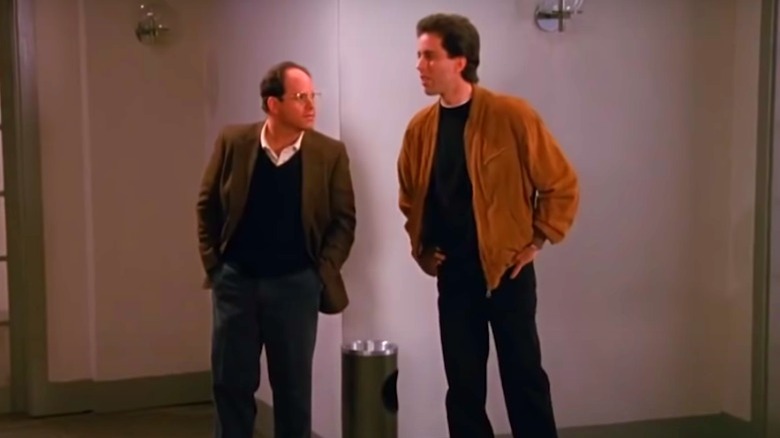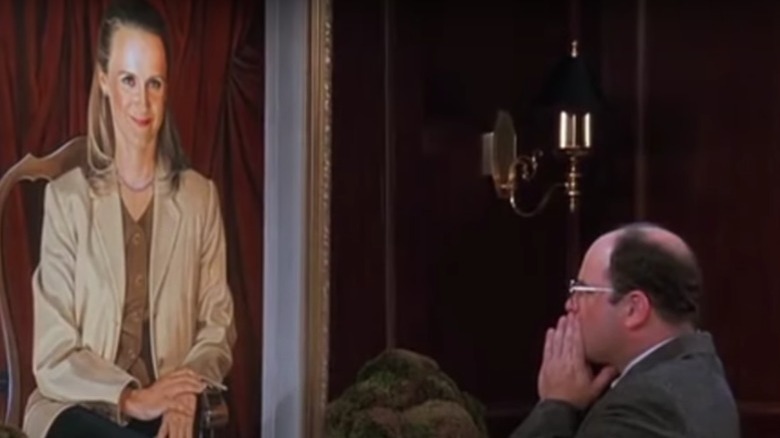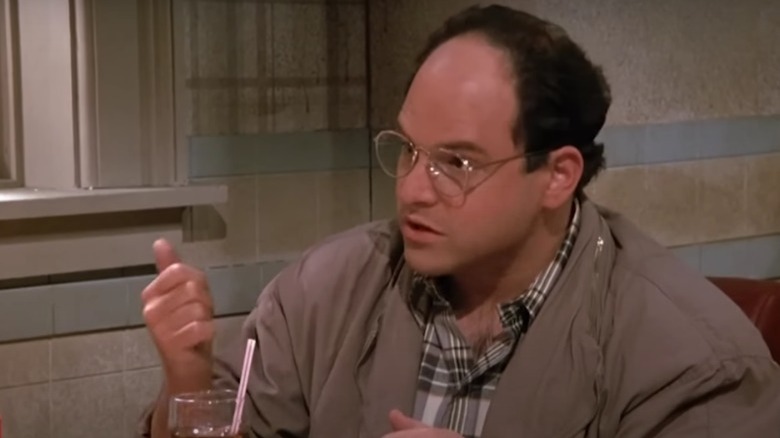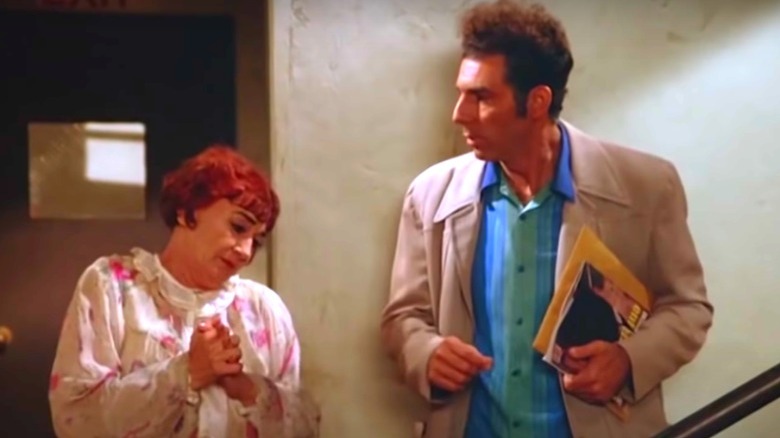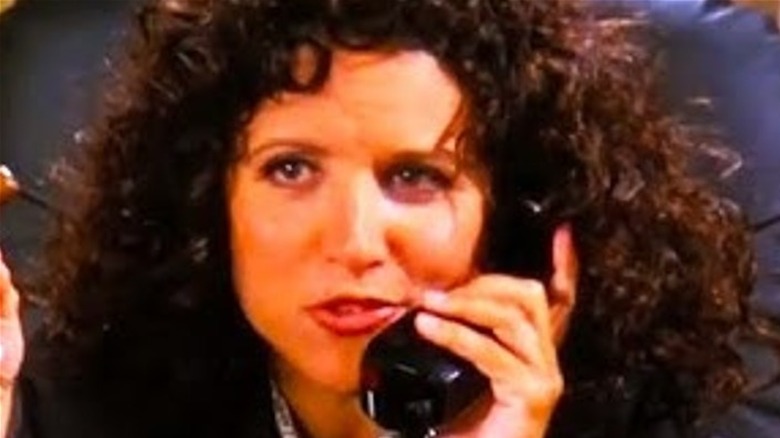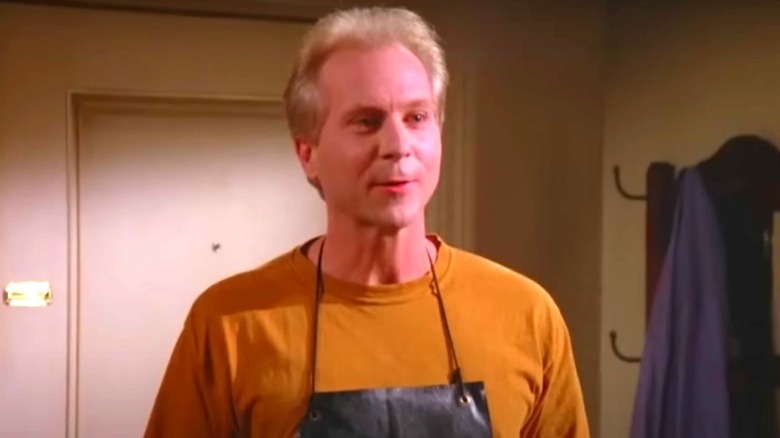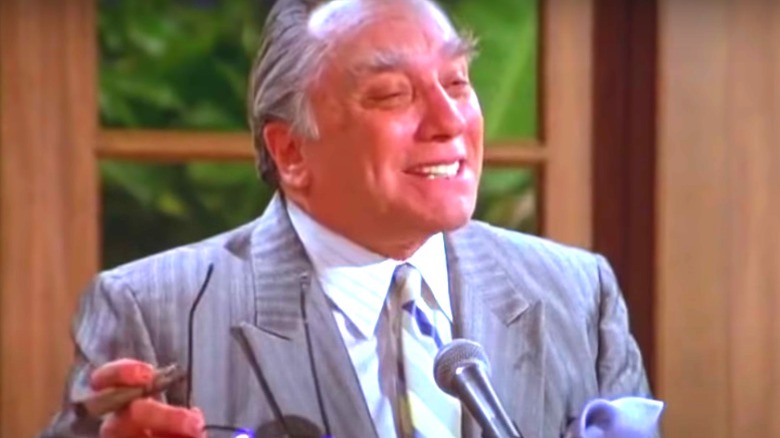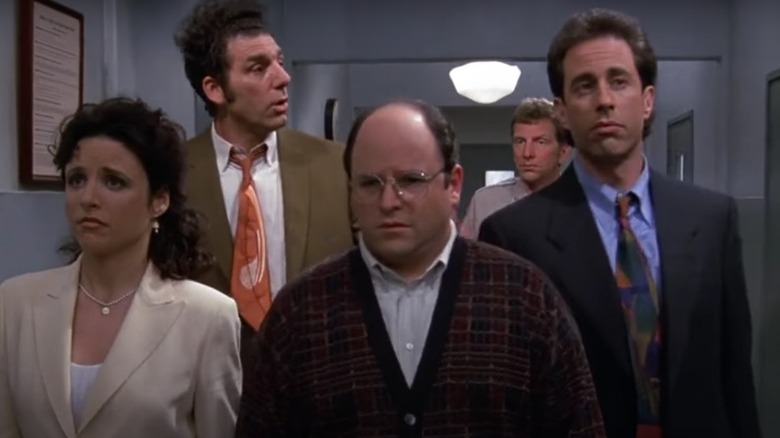Seinfeld Storylines That Fans Can't Stand
Throughout the 1990s, the hit show "Seinfeld" brought a unique brand of humor to the world of primetime sitcoms. The brainchild of comedians Larry David and Jerry Seinfeld ran for nine successful seasons on NBC and remains popular. The show follows Seinfeld and a group of other 30-somethings as they navigate life in New York City. However, instead of focusing on significant events, the show primarily highlights the funny quotidian happenings that make up real life. Unlike many sitcoms, "Seinfeld" isn't afraid to use sarcasm and dark humor, which is a big part of its appeal to viewers. Furthermore, the characters all have their own sets of neurosis that make them relatable and unique.
The characters often deal with minor issues that hilariously snowball into significant problems due to their actions. In a typical sitcom format, these problems usually resolve by the end of each episode and offer memorable laughs. Unfortunately, although this show features plenty of hilarious and heartwarming plotlines, there are some stories that even diehard fans can't stand. Some of these storylines are borderline offensive and invite controversy, while others simply fall flat. Some fans still voice their dislike for these failed storylines over two decades after the series went off the air.
Jerry and Elaine's romance
One of the most successful aspects of "Seinfeld" is the hilarious, believable chemistry between the four main characters. For example, Jerry (Seinfeld) and Elaine Benes (Julia Louis-Dreyfus) have a friendship built on snappy jokes and brutal honesty, but they ultimately care greatly for each other. There is also an apparent romantic tension between them from the beginning of the series, which suggests they could work as a couple. However, although they seem like a natural match, many fans disapprove of the decision to have Elaine and Jerry take their friendship to the next level.
Although Elaine and Jerry supposedly dated before the series began, fans get their first official taste of the two trying to be more than friends in the Season 2 episode "The Deal." The pair decide to sleep together and embark on a strictly physical relationship. While this could quickly have blossomed into a full-blown ongoing romance, this arrangement ends soon after it starts due to a lack of fan support. According to IndieWire, Jerry Seinfeld asked audiences at his stand-up comedy shows how they felt about his onscreen relationship with Elaine to gauge its popularity. After receiving an overwhelmingly negative response, the comedian decided that the two beloved characters were better off as friends. As a result, the two romantically cross paths a few more times in the series, but only in a short-term manner.
Jerry becomes a stalker
The Season 1 episode "The Stakeout" features a questionable "Seinfeld" storyline that paints both Jerry and his friend George Costanza (Jason Alexander) negatively. While attending a party, Jerry is captivated by one of Elaine's charming female friends. Unfortunately, she leaves the party before Jerry can ask for her phone number, or even her name. All he knows about her is that she works at a local law firm, the name of which he commits to memory. Later, instead of just accepting the chance encounter as a missed opportunity, Jerry decides to do something creepy. He enlists George's help in a stakeout and waits outside of the mystery woman's law firm for her to return to work.
Although Vanessa (Lynn Clark) the mystery woman takes the strange meeting in stride, Jerry and George's attempts to cover up their reason for being at the law firm are pretty cringeworthy. Despite the scenario unfolding in a humorous light, this is definitely a moment in "Seinfeld" that hasn't aged well. As The New Yorker points out, Jerry's appearance at her workplace is a clear example of stalking, which is unsettling for some viewers. George's complicity in the stakeout doesn't speak volumes about his character, either. Though it's played up for laughs, this stalking incident is the first of many examples of why the two men struggle in romantic relationships throughout the series.
Kramer's long showers
Of all the "Seinfeld" characters, Cosmo Kramer (Michael Richards) has some of the most memorable idiosyncrasies. Jerry's neighbor is very particular about many things, and those strict preferences make hilarious fodder for episode plots. However, some of his storylines are less successful than others. For example, the Season 9 episode "The Apology" focuses on Kramer's inability to finish showering in a timely manner. Kramer's issues with showers (and personal hygiene in general) recur a few times throughout the series, but this episode takes it to a new level. At first, he tries to shorten his shower times, but ends up taking the most prolonged showers possible instead.
While the episode includes plenty of classic Kramer behaviors for fans to laugh about, some fans think this storyline isn't strong enough to carry its weight and isn't as funny as it could be. For all of his eccentricities, Kramer is still relatively practical, so seeing him waste resources in this manner makes little sense. Furthermore, whereas some Kramer storylines feel like unexpected departures from reality, this one feels like it's trying too hard to keep the episode focused on him. As a result, viewers will likely zero in on the more effortless, over-the-top Kramer plots instead of this story.
Susan's memorial foundation
When George Costanza starts dating Susan Ross (Heidi Swedberg) in Season 4, it appears that the typically unlucky man has finally found love. However, the relationship is less than ideal despite the two eventually getting engaged. According to Esquire, part of the issue with Susan stems from off-screen issues between cast members who found it challenging to work with Swedberg. Nevertheless, Susan's eventual fate in the series (death by envelope-licking in Season 7) left many fans with mixed feelings. Her death embodies the darker side of the sitcom's trademark humor, but the callous reactions from all of the main characters are still a little difficult to watch for some.
However, the next chapter in the George and Susan storyline is even more unpopular. In the Season 8 episode "The Foundation," a barely grieving George receives an unexpected assignment from Susan's parents. The family wants George to be on the board of directors for a foundation they created in her name. This position disrupts George's efforts to enjoy his life as a new bachelor, but he takes on the role out of guilt. This storyline arguably highlights the depths of George's selfishness more than any other, but the real issue is its lack of a satisfying conclusion. The storyline kicks off Season 8 but quickly disappears into the "Seinfeld" ether. Sitcoms don't operate with strict continuity, but this long-running storyline could have used a more official ending.
Jerry and George trade stocks
George Costanza is the mastermind behind plenty of zany schemes, but some of these storylines are more successful than others. For example, in the Season 1 episode "The Stock Tip," he claims that an acquaintance encouraged him to buy a particular stock and suggests Jerry do the same. Both men invest $2500 in the stock, but their investment quickly backfires when they realize they know nothing about the stock market. George's acquaintance ends up in the hospital, rendering him unable to tell them when to sell their stock. Unsurprisingly, the stock price falls, and George and Jerry lose money on their reckless investment.
Money-making schemes are nothing new for the "Seinfeld" crew, but this storyline is just plain dull. The friends usually come up with far more inventive plans, which feature more twists and turns on their way to inevitable failure. Instead, this brief, ill-fated journey into stock trading quickly becomes repetitive. In a Reddit thread about the worst episodes in the series, "The Stock Tip" is at the top of several users' lists. Most notably, the original poster finds the episode too irritating to even discuss in depth. Thankfully, storylines involving get-rich-quick plans get stronger and more engaging as the series progresses.
Kramer goes to Hollywood
Many people dream of Hollywood stardom, but Kramer's choice to move to Los Angeles is one of the character's weaker storylines. The final episode of Season 3, "The Keys," features Kramer deciding to take a swing at an acting career after a falling out with Jerry. The longtime neighbors argue about Kramer's overuse of Jerry's spare keys, and the disagreement ends with Kramer reluctantly returning them. Jerry later feels guilty about the argument's impact on Kramer, but it's already too late to make amends. The episode includes some funny scenes from Kramer's travels and sets the stage for an amusing subplot. However, when the story continues in the two-part premiere of Season 4, "The Trip," many viewers may feel slightly disappointed.
The premiere follows Kramer through a case of mistaken identity in which authorities believe he is a serial killer. While this premise offers plenty of laughs, the tone and aesthetics aren't as on-brand as other episodes. As The A.V. Club points out, the storyline could easily be from a different series. "Seinfeld" never shies away from dark humor, but both parts of "The Trip" are decidedly darker than usual. Furthermore, the events have no real impact on the characters. By the end, Kramer winds up home in New York, scrounging through Jerry's refrigerator like any other day. This lack of continuity is typical in sitcoms, but it's a bit of a letdown for a story that takes the friends across the country and back.
Elaine's brief time as CEO
Elaine's struggles with traditional 9-to-5 jobs make her highly relatable, but one short-lived storyline changed her career and fans' ability to commiserate with her. At the beginning of Season 8, her longtime boss J. Peterman (John O'Hurley) disappears to Burma and leaves his company behind. In an unexpected phone call, he tells Elaine that she is now the acting CEO of his corporation. While she has no apparent experience running a company that size, Elaine immediately lets the power go to her head and exhibits some of her most obnoxious behavior in the series. She shifts from an everyday employee to an overbearing boss in the blink of an eye.
Unfortunately, this storyline reinforces some fans' poor opinions of Elaine. One Reddit user dedicated a thread to their hatred, calling Elaine selfish and childish. Other users assert that she is annoying and entitled, particularly in the series' later seasons. Elaine proves their point by giving off an entitled attitude during her brief stint as CEO, going so far as putting her feet up on her boss' desk and smoking his cigars. Luckily for fans, the beloved J. Peterman returns soon after, bringing this storyline to a close and putting Elaine back in her rightful role as his employee.
Elaine's relationship with Joe Davola
Although none of the main "Seinfeld" characters manage to find lasting love, Elaine's dating troubles are some of the worst. When she inadvertently starts seeing a man named Joe Davola (Peter Crombie), her love life goes from unlucky to downright terrifying. Davola first appears as a fellow would-be writer who holds Jerry responsible for his lack of success. He continues to harass Jerry periodically in the early seasons and is most recognizable for his impulsive behavior and short temper. Unfortunately, in the Season 4 episode "The Watch," Elaine has her first encounter with Davola and decides to start dating him, unaware that her new boyfriend is Jerry's infamous stalker.
This storyline comes to a creepy climax in Season 4's "The Opera," when Davola begins to suspect that Elaine has been unfaithful. As one Reddit user pointed out, this episode feels more like a short horror film than a sitcom episode. Elaine unknowingly puts her own life at risk by going to find Davola at his apartment, facing what another Reddit user described as a nightmarish situation for most women. Although she emerges unscathed, this is one storyline from Elaine's dating life that goes a little too far for some fans. To the relief of viewers, she never reencounters this dangerous character.
The Jack Klompus story
Problematic neighbors can be a great source of humor in sitcoms, but Jack Klompus (Sandy Baron) is downright annoying. His storyline centers on The Pines Of Mar Gables condominium in Florida, where he spends his days insulting and undermining Jerry's dad Morty (Barney Martin) in Season 3. He resents Morty's position as president of the condo association and frequently tries to get more power for himself. Some of his behavior is funny, but most of the time he is more mean-spirited than amusing. One Reddit user dedicated a thread to their hatred of this recurring character, and many other fans agreed. Klompus is obnoxious, petty, and prone to holding grudges.
For example, his first appearance in "The Pen" features him giving Jerry his Space Pen and then later insisting that Jerry give it back. Although most people would chalk the situation up to a miscommunication, Klompus expresses his ongoing bitterness about the pen on multiple occasions. He also commits several acts that sabotage the Seinfelds, such as in "The Raincoats," when he breaks a window in Morty's locked garage to retrieve some raincoats. Although Morty technically asks Klompus to get the coats, breaking the window is a reckless choice that later leads to a burglary. When this storyline ends in Season 3's "The Money," many fans are happy to see this character leave the series.
Elaine attempts a conversion
In the Season 6 episode "The Beard," Elaine's storyline may be offensive to some viewers. However, the story begins with what seems like a good deed — Elaine goes to the ballet with Robert (Robert Mailhouse), a man who works for a conservative bank and fears that his homosexuality might be problematic to his employers. Elaine is supposed to pose as his date, but she later gets carried away and decides she wants Robert to be her real-life boyfriend. Her fake date is cultured, well-spoken, and attractive — everything Elaine could want in a partner. Jerry tries to talk her out of planning to convert Robert to heterosexuality, but she refuses to listen.
Her subsequent attempts to convince Robert to be with her are cringeworthy at best. As a result, Elaine comes across as desperate and oblivious instead of funny. Furthermore, the idea that someone can change their sexual orientation at will is outdated, and this storyline has thus aged very poorly. One of the worst parts of this plot is Elaine's short-lived success. She gloats to Jerry that Robert has succumbed to her womanly charms, wrongly believing that her plan worked. Although "Seinfeld" generally presents the LGBTQ+ community positively, this storyline is a major misstep.
The Finale
The series finale of any television show has a lot to live up to, and it's not uncommon for fans to feel let down by unsatisfying conclusions to beloved series. Unfortunately, the final episode of "Seinfeld" left many viewers underwhelmed. In this episode, the crew finds itself stranded in small-town Massachusetts where they unwittingly violate a local Good Samaritan ordinance. The ensuing trial is a media circus and seems like an appropriate dose of karma for the characters' ongoing self-absorbed behavior throughout the series. Figures from their past come forward to testify about many of their prior harmful acts, and the final moments show the four friends in prison together.
Despite this whirlwind of events, the finale ends without the characters experiencing any significant moments of growth or change. Although learning their lesson certainly wasn't a requirement, many fans and critics found the finale's storyline a little anticlimactic. Furthermore, as users in a Reddit thread pointed out, one of the biggest problems with this finale is its heavy reliance on clips from previous episodes. Clip shows are a common element in sitcoms, however, this trip down "Seinfeld" memory lane makes the episode's present-tense storyline less satisfying despite its funny premise. Of all the episodes in the series, the finale is perhaps the most divisive for fans.
